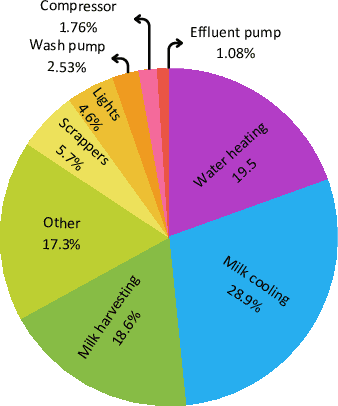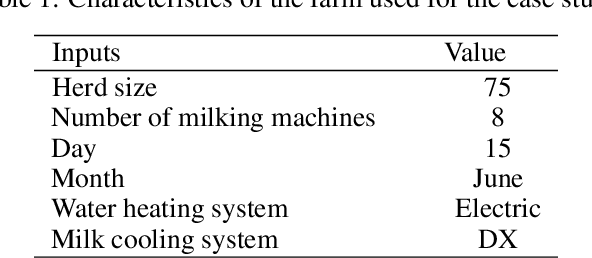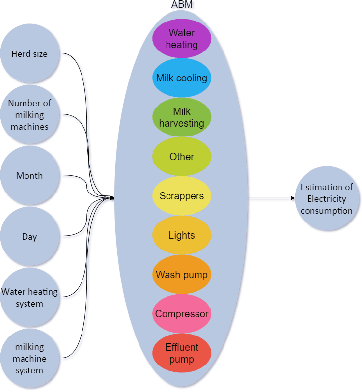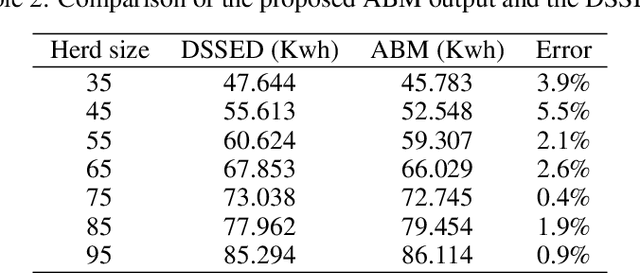Abdul Wahid
A Reinforcement Learning Approach to Dairy Farm Battery Management using Q Learning
Mar 19, 2024Abstract:Dairy farming consumes a significant amount of energy, making it an energy-intensive sector within agriculture. Integrating renewable energy generation into dairy farming could help address this challenge. Effective battery management is important for integrating renewable energy generation. Managing battery charging and discharging poses significant challenges because of fluctuations in electrical consumption, the intermittent nature of renewable energy generation, and fluctuations in energy prices. Artificial Intelligence (AI) has the potential to significantly improve the use of renewable energy in dairy farming, however, there is limited research conducted in this particular domain. This research considers Ireland as a case study as it works towards attaining its 2030 energy strategy centered on the utilization of renewable sources. This study proposes a Q-learning-based algorithm for scheduling battery charging and discharging in a dairy farm setting. This research also explores the effect of the proposed algorithm by adding wind generation data and considering additional case studies. The proposed algorithm reduces the cost of imported electricity from the grid by 13.41\%, peak demand by 2\%, and 24.49\% when utilizing wind generation. These results underline how reinforcement learning is highly effective in managing batteries in the dairy farming sector.
Modelling Electricity Consumption in Irish Dairy Farms Using Agent-Based Modelling
Aug 18, 2023



Abstract:Dairy farming can be an energy intensive form of farming. Understanding the factors affecting electricity consumption on dairy farms is crucial for farm owners and energy providers. In order to accurately estimate electricity demands in dairy farms, it is necessary to develop a model. In this research paper, an agent-based model is proposed to model the electricity consumption of Irish dairy farms. The model takes into account various factors that affect the energy consumption of dairy farms, including herd size, number of milking machines, and time of year. The outputs are validated using existing state-of-the-art dairy farm modelling frameworks. The proposed agent-based model is fully explainable, which is an advantage over other Artificial Intelligence techniques, e.g. deep learning.
Reinforcement Learning for Battery Management in Dairy Farming
Aug 17, 2023


Abstract:Dairy farming is a particularly energy-intensive part of the agriculture sector. Effective battery management is essential for renewable integration within the agriculture sector. However, controlling battery charging/discharging is a difficult task due to electricity demand variability, stochasticity of renewable generation, and energy price fluctuations. Despite the potential benefits of applying Artificial Intelligence (AI) to renewable energy in the context of dairy farming, there has been limited research in this area. This research is a priority for Ireland as it strives to meet its governmental goals in energy and sustainability. This research paper utilizes Q-learning to learn an effective policy for charging and discharging a battery within a dairy farm setting. The results demonstrate that the developed policy significantly reduces electricity costs compared to the established baseline algorithm. These findings highlight the effectiveness of reinforcement learning for battery management within the dairy farming sector.
BERT-Embedding and Citation Network Analysis based Query Expansion Technique for Scholarly Search
Jan 26, 2023



Abstract:The enormous growth of research publications has made it challenging for academic search engines to bring the most relevant papers against the given search query. Numerous solutions have been proposed over the years to improve the effectiveness of academic search, including exploiting query expansion and citation analysis. Query expansion techniques mitigate the mismatch between the language used in a query and indexed documents. However, these techniques can suffer from introducing non-relevant information while expanding the original query. Recently, contextualized model BERT to document retrieval has been quite successful in query expansion. Motivated by such issues and inspired by the success of BERT, this paper proposes a novel approach called QeBERT. QeBERT exploits BERT-based embedding and Citation Network Analysis (CNA) in query expansion for improving scholarly search. Specifically, we use the context-aware BERT-embedding and CNA for query expansion in Pseudo-Relevance Feedback (PRF) fash-ion. Initial experimental results on the ACL dataset show that BERT-embedding can provide a valuable augmentation to query expansion and improve search relevance when combined with CNA.
A Graph Convolutional Neural Network based Framework for Estimating Future Citations Count of Research Articles
Apr 11, 2021



Abstract:Scientific publications play a vital role in the career of a researcher. However, some articles become more popular than others among the research community and subsequently drive future research directions. One of the indicative signs of popular articles is the number of citations an article receives. The citation count, which is also the basis with various other metrics, such as the journal impact factor score, the $h$-index, is an essential measure for assessing a scientific paper's quality. In this work, we proposed a Graph Convolutional Network (GCN) based framework for estimating future research publication citations for both the short-term (1-year) and long-term (for 5-years and 10-years) duration. We have tested our proposed approach over the AMiner dataset, specifically on research articles from the computer science domain, consisting of more than 0.8 million articles.
 Add to Chrome
Add to Chrome Add to Firefox
Add to Firefox Add to Edge
Add to Edge